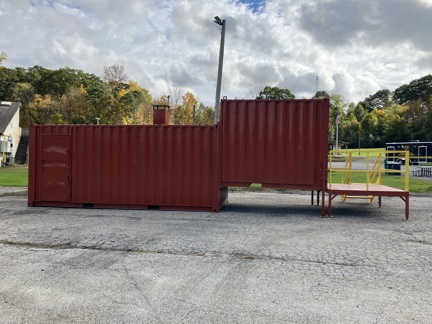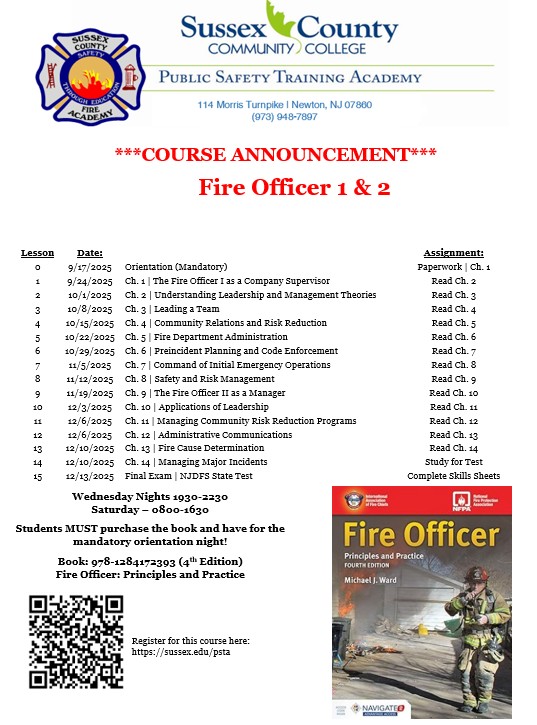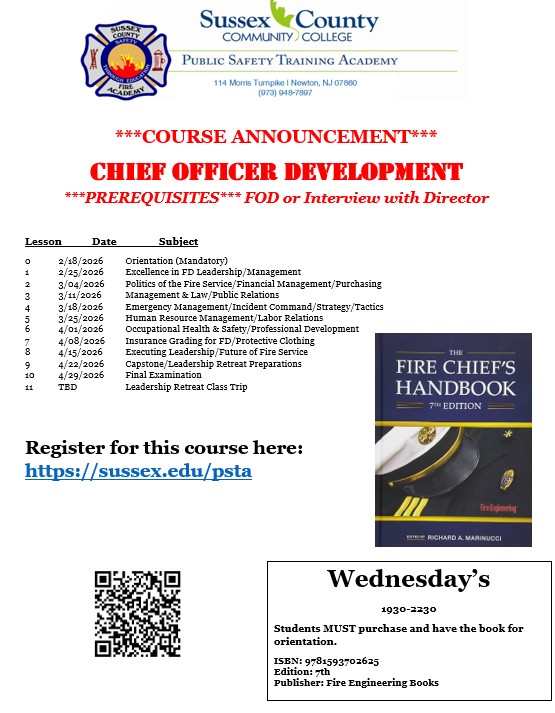The Public Safety Training Academy offers courses for firefighters. Please see the list of courses offered below and use the Registration Form for each course you will be attending.
Tuesday Night | Thursday Night | Saturday All Day
Course Start: January 17, 2026
***Mandatory Orientation Day ***
01/17/2026 @ 0830
Course End: June 27, 2026
(if no weather delays)
1930 - 2230 Nights | 0800 - 1630 Days
Fee: In-County FREE | $750 Out-County
Firefighter 1 is the first level of a progressive program. This level introduces the novice firefighter to the basics of nationally recognized firefighting techniques. Methods of instruction will include classroom theory and skill-oriented "hands‑on" drill sessions. Student performance will be evaluated throughout the course, including quizzes, mid‑term, and final exams, both written and practical. The New Jersey Division of Fire Safety's standardized Firefighter 1 test is given as part of the final exam. Firefighter 1 meets the performance objectives of the NFPA standard 1001 and N.J.A.C. 5:73‑4.3 standard, allowing a firefighter to perform firefighting under direct supervision. All students will receive ICS, CPR, Hazardous Materials Awareness, and Operational Levels of Training as required by N.J.A.C. 5:75-6.1.
Firefighter 2 is the second level of a progression that includes Firefighter 1. Instruction at this level will be aimed at providing the student with the skills and knowledge necessary to function under general supervision. Students will learn advanced strategies and tactics in the following: IMS, Rapid Intervention, Extrication, Advanced Suppression, Advanced Search, VES, Rescue Task Force Awareness, and assisting Technical Rescue Crews, just to name a few.
*Mandatory Evaluation must be completed to satisfy NJDFS Job Performance Requirements*
Further instructions will be emailed upon registration.
Firefighter 2 Update:
Firefighter 2 is no longer offered as a stand-alone course. All future enrollment will be by an interview process only. For more information, please contact Director Dixon directly.
Flashover is the stage of a fire at which all surfaces, gasses, and products of combustion are heated to their ignition temperature and flame breaks out almost at once within the compartment area. This course will teach you to develop a working definition of a flashover, understand the 3 phases of flashover development, identify the 5 signs of an impending flashover, identify factors that can influence the development of a flashover, associated tactics such as PPV and VES and give you the understanding of the benefits and limitations of our structural fire fighting gear. We will also cover firefighter survival techniques in the unfortunate event a flashover occurs.
Firefighters seldom have the opportunity to observe a fire as it goes through its life cycle and this course will provide all of this information and more.
***Please register as a Department. Individual registrations will not be honored at this time.


Active Shooter Incident Management (ASIM) Basic is a four-hour introductory course demonstrating the ASIM Checklist integrated response process to law enforcement, fire, and EMS responders. Instructors introduce key concepts of integration and engage responders in hands-on functional exercise scenarios, enabling response practice while improving comprehension and retention.
The ASIM model focuses on a three-level priority system to address stopping the active threat, facilitating a quick rescue of the injured, and enabling clearing for additional threats.

This course addresses:
Participants:
Course Scheduling & Registration is through NJOHSP, and links will be provided here when active. This course is FREE.


2026
2026
2026